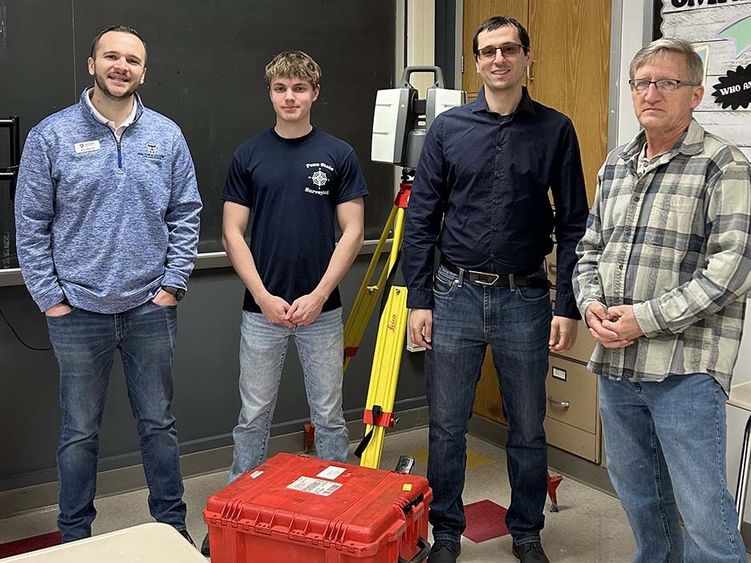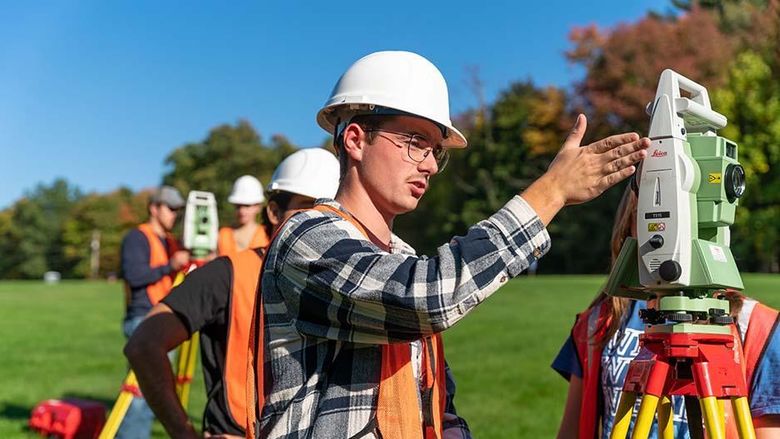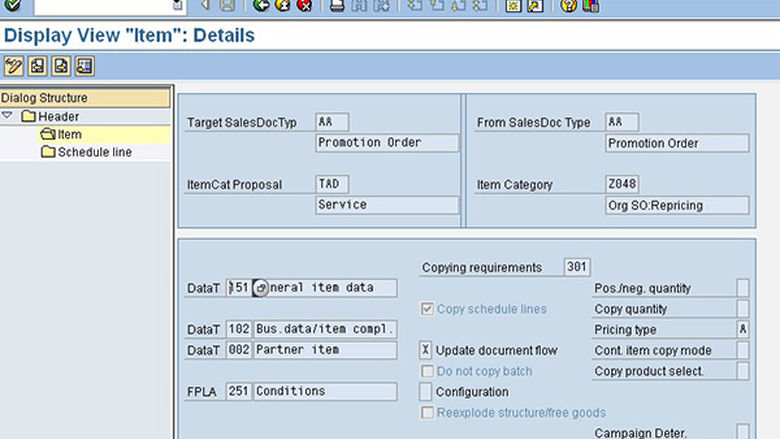
At the presentation at Athens Area High School are, from left: Alex Ellsworth, associate director of admissions; Luke Jones, surveying engineering student; Dimitrios Bolkas, associate professor of surveying engineering; and Todd Babcock, vice president, Pennsylvania Society of Land Surveyors, and Sayre office lead, Civil & Environmental Consultant Inc.
DALLAS, Pa. — Penn State Wilkes-Barre is sharing information about its surveying engineering program and the career possibilities in the profession through presentations and career fairs at several high schools.
“Visits like these help us spread the word about surveying and share with students the incredible scope of career opportunities open to them in this field,” said Associate Professor of Surveying Engineering Dimitrios Bolkas. “We get to demonstrate the technology surveyors use and connect with the students and educators about all the contributions surveying makes to society.”
Several of the high school visits were planned in conjunction with National Surveyors Week, celebrated annually during the third week of March. The visits include Tunkhannock Area High School, Wyoming Valley West High School, Athens Area High School, Towanda Area High School, Bucks County Technical High School, Northern High School’s Opportunities Fair in Dillsburg and Junior Achievement of NEPA JA Inspire in the Mohegan Sun Pocono Hotel and Convention Center.
“Some teachers who are familiar with surveying engineering contacted us because they know we are the only surveying program in the area,” Bolkas said. “But sometimes even teachers or guidance counselors don’t know about surveying engineering. We reached out to them so they can expose their students to this unique profession that enables them to spend much of a workday outside. With career opportunities on land, sea and the air, the field offers numerous options for employment.”
During the presentations, Bolkas is accompanied by a student, who is often a graduate of the high school where they are visiting. This adds a level of familiarity and allows the high school students to speak to someone in a similar situation to theirs. The presentations give an overview of Penn State Wilkes-Barre’s surveying engineering program, which includes a bachelor’s degree in surveying engineering and an associate degree in surveying engineering technology. Bolkas and the student also answer questions and demonstrate equipment, including a robotic total station, GPS receivers, a laser scanner and a drone.
“We talk about the courses they need to take, the cost of getting a degree in surveying, the location of all the surveying programs in the United States and the opportunities available in the surveying profession,” Bolkas said. “We also allow them to use the instruments and take sample measurements.”
Lucas Carpenter, a junior majoring in surveying engineering and a graduate of Tunkhannock Area High School, accompanied Bolkas to Tunkhannock and Bucks County Technical High School. He said he appreciated the opportunity to connect with students with similar interests who are in the position he was three years ago.
“I feel that I gave them someone to relate to. I was someone who they could see as an example of how my journey panned out,” Carpenter said. “Both Tunkhannock and Penn State Wilkes-Barre have played a key role in my development. As I told the students, when you have an interest in as broad of things as I did, finding a career seems impossible. But because of my teachers and experiences at Tunkhannock, I was able to get into surveying and because of Penn State Wilkes-Barre and people like Dr. Bolkas, I have been succeeding here.”
He showed the students equipment he and his peers use as part of their studies and talked with them about how they would be able to gain hands-on experience with the equipment starting from their first surveying engineering course at Penn State Wilkes-Barre.
“I talked to the students about the opportunities that I and many of my classmates have gotten and how these opportunities continue to grow while the number of surveyors continues to stay the same, if not decline,” Carpenter said.
Bolkas said that due to the average age of surveyors today as well as increased licensing and educational requirements during the past 30 years, the field of surveying has a high need for professionals entering the field. Many of Penn State Wilkes-Barre’s surveying engineering students, including Carpenter, receive paid internships while still in school.
“Graduates of our program have options for the branch of surveying they want to work in and where they want to work,” he said. “Many of them have two or three job offers before they graduate. They get to make the choice of what they will do with their degree and where they will go.”
The high school presentations are just one way that Penn State Wilkes-Barre’s surveying engineering students have an opportunity to connect with those with similar interests. They will also participate in the student competition of the National Society of Professional Surveyors (NSPS) in April and have attended the conference of the Pennsylvania Society of Land Surveyors (PSLS) as well. It was at a previous PSLS conference that Bolkas and his students met a teacher and students from Bucks County Technical High School and were able to begin discussions about sharing their knowledge and experiences.
Penn State Wilkes-Barre also hosted the Trig-Star competition on March 22 to show the practical applications of math, particularly trigonometry. Students from throughout northeastern Pennsylvania competed in Trig-Star.




